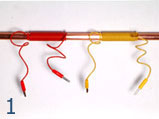
 |
 |
||
 |
 |
 |
|
What Makes Water Hard?Acid
in rain
Most people have heard of acid rain produced by absorption of sulphur and nitrogen oxides by rainfall; however, the presence of pollutants like these gases is not the only source of acidity. Carbon dioxide constitutes 0.3% of the Earth's atmosphere, and is readily absorbed by water to form carbonic acid - the acid found in carbonated beverages. Therefore, all rain is acidic to some extent, and has a strong tendency to dissolve minerals and rocks with which it comes into contact. Water is a good solvent and gathers impurities easily. Pure water, which is tasteless, colorless, and odourless, is often called the universal solvent. As rain falls it becomes slightly acidic as described above. As the water travels through soil and rock, it dissolves small amounts of minerals and holds them in solution. As already mentioned, Dissolved calcium and magnesium in water are the most common causes of hard water. The level of hardness increases as the magnesium and calcium increases. Below is British Standard 7593: 1992 as used in the UK and this categorises mains water supplies as follows:
|
Fit
an Eddy water descaler to combat the
nuisance of hard water and limescale in the home
Risk free. 12 month money-back
guarantee.
Lifetime guarantee against unit failure !
